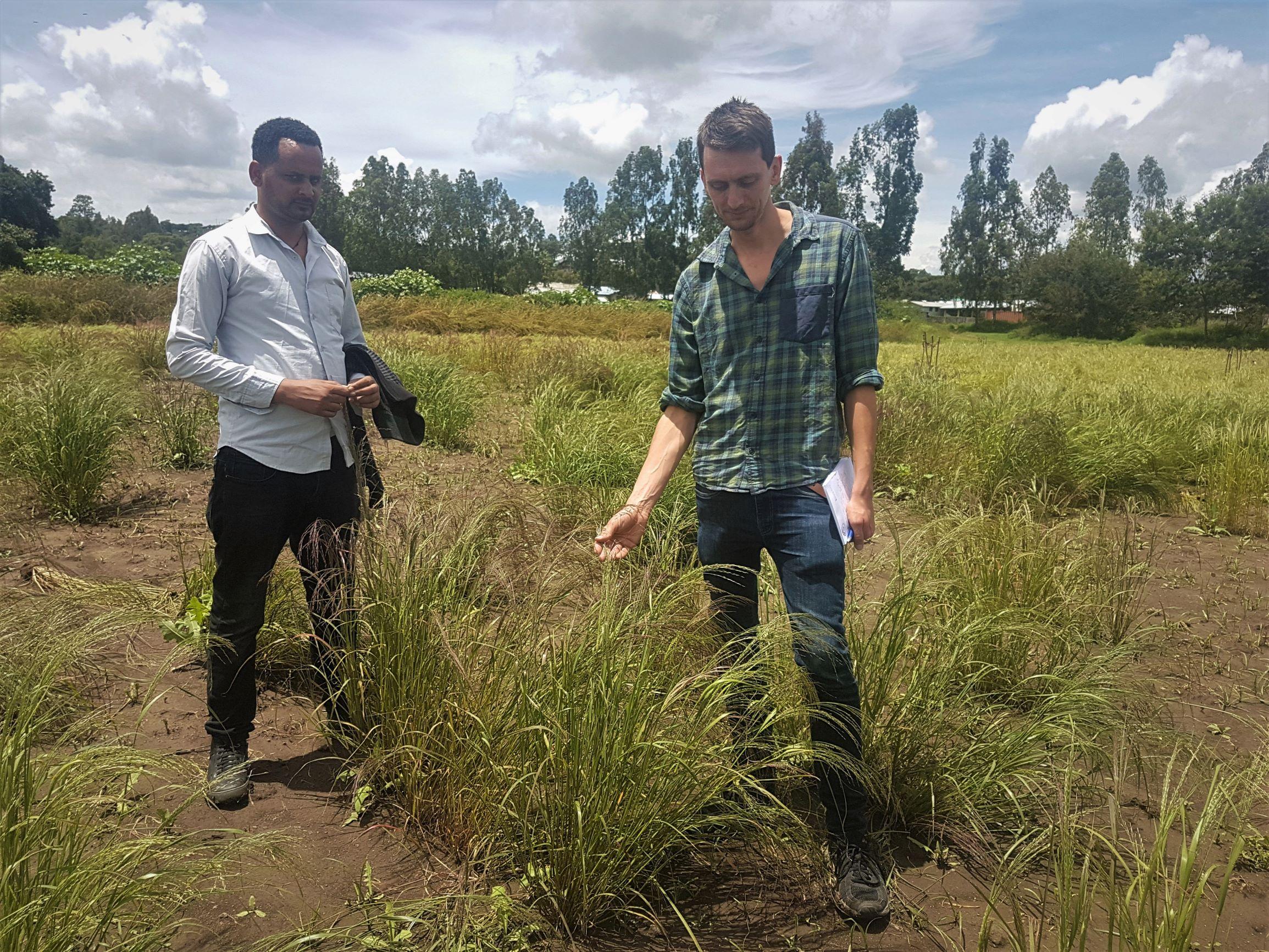
Submitted by K.L. Hlaba on Mon, 20/04/2020 - 12:21
PhD student Nick Fradgley travelled to Ethiopia in 2019, with the support of the Cambridge Global Food Security Early Career Researcher Travel Fund, to conduct research on how teff, sorghum, finger millet, and durum wheat are bred. Find out how he planned his trip, what he learned, and how this has broadened his views on the complex issues that surround food security in Ethiopia.
My interest in crop research started while I was working on local arable farms in Dorset where I grew up. After studying ecology and conservation for my undergraduate degree at Exeter University, I was able to apply this interest to a couple of jobs assisting in crop field trials. This developed from practical agrochemical testing to more academic plant breeding research, and I am currently in the second year of my PhD. My research is investigating the genetic control of wheat milling and baking quality traits with the National Institute of Agricultural Botany (NIAB) and the University of Cambridge, as well as breeding company (DSV UK) who are industrial partners in the project. My PhD is funded by the BBSRC.
I am studying wheat breeding, and focusing on the genetic control of milling and baking quality traits. As wheat breeding has mainly focused on yield, this has been at the expense of some quality traits, such as protein content, which trade off against each other. My project aims to uncover the genetic control of these quality traits so that breeders can more efficiently predict quality, and can simultaneously select for yield and other important traits to develop sustainable and productive milling quality wheat varieties.
Developments in crop breeding over the last century have been crucial in ensuring adequate food supply for the rapidly growing global population. However, purely focusing on maximising productivity has, in some ways, resulted in an inefficient and unsustainable food system where many crops, such as wheat, which could feed people directly, are all too often used to feed livestock. So ensuring that high quality wheat varieties are suitable for a productive and sustainable food system is key for future food security.
After working on a small project looking at zinc content in Ethiopian teff varieties, I was fascinated by the novel and underutilised crops of Ethiopia, which is a centre of crop diversity. In particular, crops such as teff, sorghum and millets are known as orphan crops as there has been little research and breeding work conducted on them, and they have existed as farmer land races (locally adapted and traditional crop varieties). Building on contacts made by colleagues at NIAB working on the MillNET_i project, I visited several research institutes in and around Addis Ababa. These included the Ethiopian Institute of Agricultural Research (EIAR), who are developing breeding programmes for improved teff varieties, ICRISAT, who are working with smallholder farming groups, and the Ethiopian Biodiversity Institute (EBI), which safeguards valuable crop genetic resources in a gene bank in Addis Ababa. Here I saw some really impressive examples of how they are using crop genetic diversity to develop improved varieties of crops including teff, sorghum, finger millet, and durum wheat that they have bred to deal with issues such as lodging (where the crop falls over making harvesting difficult), drought or water logging, and pest and disease resistance. All of this is done with limited technologies and resources.
More broadly, these visits were extremely valuable for me to gain an insight into the complex issues surrounding food security in this rapidly developing country. For example, Ethiopia’s economy is expanding with the help of foreign investment, smallholder farming is scaling up, and people are moving towards more urban lifestyles and diets. Additionally, Africa is experiencing more severe climate change effects than the rest of the world. It is clear to me that crop research tools and resources created in countries such as the UK could be usefully applied to assist with Ethiopia’s complex food security challenges.
Initially, I made contact with the researchers I met with through email, but it was difficult to make clear plans in advance this way. Mainly because of cultural differences. It came down to just turning up with a list of phone numbers, which was quite stressful, but things worked out well in the end!
Logistically, finding safe and reliable transport was a real issue. It was impossible to work out where any of the busses were meant to be going, and the traffic in Addis Ababa was chaotic. However, contacts at the institutes I was visiting were helpful in arranging transport.
Thanks to the contacts and ideas I developed on the trip, we have already managed to gain further funding from the GCRF for a short project to develop some genetic mapping and phenotyping resources with the teff breeding programme at EIAR. It is very exciting to be working with such a unique and underutilised crop.
I don’t like to plan these things too far in advance, but when I finish my PhD in a couple of years I hope to ensure my further work is on the applied side of crop breeding, whether in academia or industry.
It has been great for me to see research and its wider implications in a more global context than just wheat in the UK. I have definitely had to think about what the wider socioeconomic and ethical issues are surrounding crop improvement in the developing world.
When planning research trips, obvious things like visas, vaccinations and risk assessments are important to sort out well in advance, but otherwise, a degree of flexibility is important for making things happen. It is very easy to have blinkered views of the specific aims of a PhD project, so it has been really useful and refreshing to take time to look at the bigger picture, and think about how my research fits into it.
Please find Nick's profile on our website.
Photo supplied by Nick Fradgley.

